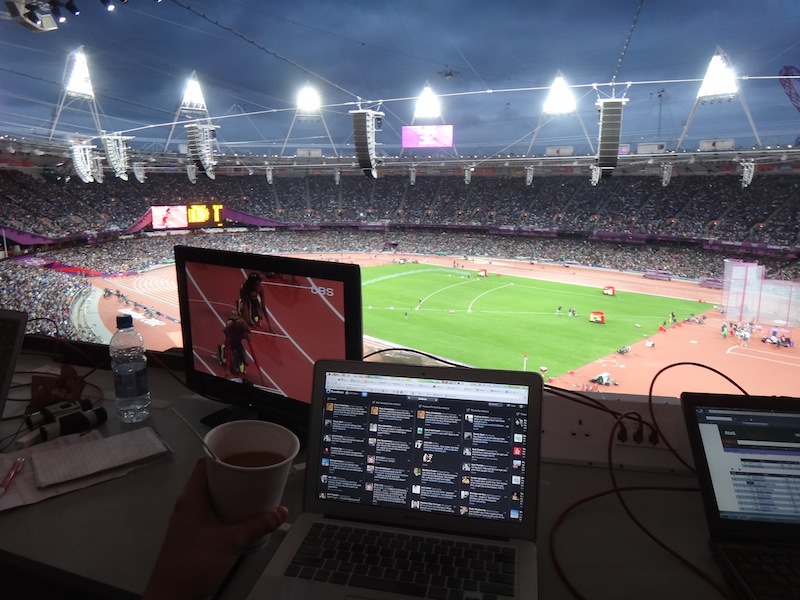Covering the Olympics requires Olympic-level endurance. Going into London, I knew I was looking at three straight weeks of hard work, no play, and very little sleep. After all, as a mentor told me, “This is a marathon, not a sprint.”
Heading into the last weekend of the Games, everyone’s tired. We’ve all been tired for a while now. I’m running on caffeine and sugar, and a lot of it. The “quiet room” is more full than usual, with journalists taking up every lounge chair, trying to catch forty winks before heading off to their next event.

Or the main room. That works too.
I know every journalist’s experience is different, especially depending on roles (reporter vs editor; director vs producer vs talent) and the sports they cover (especially if you have to travel from venue to venue). Even for me, every day is completely different. So I can only give an idea of how my days are spent — some days I’m mostly in the Main Press Center; others I’m out conducting interview or going to media events. However, here is a general pattern of how I’ve been spending my long days:

Anywhere between 6:00-8:00: Depending on the time I went to sleep the night before and what’s on the agenda for the day determines if I wake up early or late (late being…8. Man, is 8am bliss). Shower, pack up my gear for the day: laptop, DSLR, point and shoot, iPhone, BlackBerry, and all relevant chargers.
Head out, stopping first into the store below the flat to chat to the friendly shopkeeper and grab a liter of water for 80 cents. It’s a marathon after all, you need to hydrate — plus, a bottle of water costs a silly £1.05 at the MPC.

Mid-morning: If I have a special event like an interview or media event, I head there and won’t arrive at the media center until afternoon. Otherwise I take the bus or tube from Angel to King’s Cross, and cross the street to St. Pancras International. The brilliant Javelin bullet train has me in Stratford in six minutes.
When I arrive at Stratford, I head straight for the media entrance, which is across from the Athletes’ Village; passing the line of hardcore pin collectors waiting outside like vultures, eyeing up media and athletes alike for possible trades.

Security the first few days was run by the military; now it’s all G4S folks in bright green shirts. The military still run some other checkpoints, though.

The classically British double-decker bus only takes a few minutes to get through Olympic Park. If I’m in the MPC in the morning, I’m usually there by 10; 11 at the latest. Most days I stop at the media center McDonalds first for breakfast.

I head to our office on the second floor, pausing outside the L’Equipe office to read their latest newspaper, which they tape to the walls next to their door.
11:00: I head to the main conference room on the first floor for the IOC daily media briefing. They give stats on attendance and drug tests, talk about a chosen daily subject, then open the floor to questions from the media, whose questions always run the gamut.
Afternoon: I write, I edit, I do some research going into the evening’s events. Editing for the website may be thrown in there as well. Some days I go to watch heats in the venues, but usually I follow them on the internal television channels.
Even though we have an office, I actually prefer the media workroom — there are loads of televisions down there, meaning I can follow more events at once; plus there’s something about being surrounded by hundreds of Olympic journalists that makes me want to work harder. And it’s warmer down there — our office is freezing.

17:00-18:00: Head for the venues, getting onto the media buses while trying to avoid the photographers’ massive kits that are undoubtedly worth thousands of dollars. If it’s a big event, like a final with Michael Phelps or Usain Bolt, I head over early to grab a good seat in the press tribunes.

19:00-21:00: Watch the event from the press tribunes, meaning with the luxury of power outlets, ethernet cables, and a television that shows us the action going down on the field of play.
21:00-23:00: Head down to the venue’s media conference room to listen to post-event press conferences with the athletes.
23:00-02:00: File story. Take media bus back to Stratford, then Javelin to St. Pancras, then tube to Angel, then walk home. Fall asleep immediately and go to bed dreaming of what it’d be like to sleep in past 8 am.
The post London 2012: A day in the life appeared first on Expat Edna.
